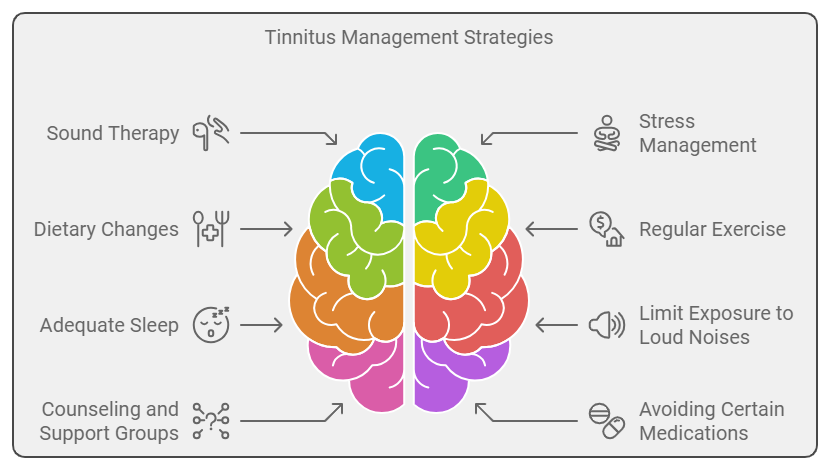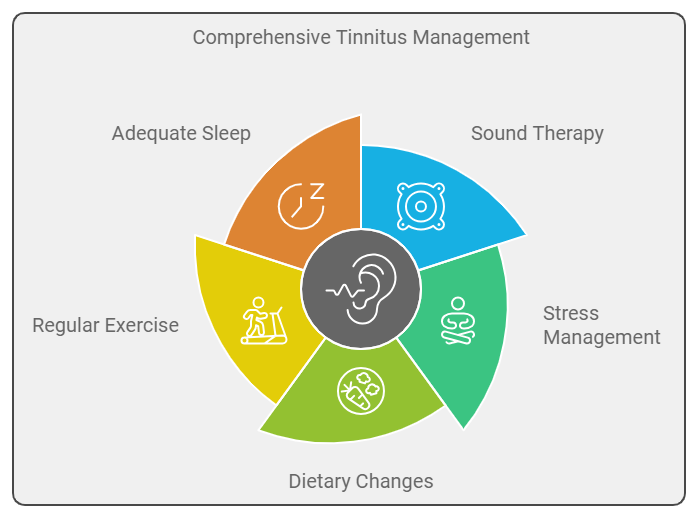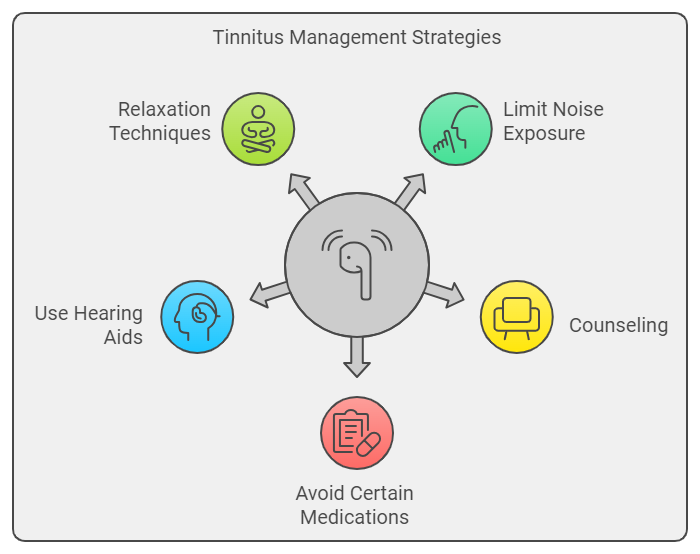
Top 11 Tinnitus Management Strategies.
Expert Advice on Lifestyle Changes That Can Help Reduce Tinnitus Symptoms.
Tinnitus, often described as a ringing or buzzing in the ears, affects millions of people worldwide. While there is currently no universal cure, various strategies can significantly alleviate symptoms and improve quality of life. In this post, we’ll explore 11 expert-backed tinnitus management strategies, including lifestyle changes, coping techniques, and a special supplement that may provide relief.
1. Sound Therapy
One of the most effective strategies for managing tinnitus is sound therapy. This involves using external sounds to mask the internal noise of tinnitus. White noise machines, soft music, or nature sounds can provide a soothing background that distracts from the ringing. Research has shown that consistent exposure to pleasant sounds can help retrain the brain’s response to tinnitus, making it less intrusive over time.
2. Stress Management
Stress can exacerbate tinnitus symptoms, making stress management essential. Techniques such as yoga, meditation, and deep breathing exercises can lower stress levels and improve overall mental health. According to a study published in Psychology & Health, mindfulness meditation can significantly reduce tinnitus severity by promoting relaxation and mental clarity.
3. Dietary Changes
Certain foods and drinks may worsen tinnitus symptoms. Caffeine, alcohol, and high-sodium foods can contribute to increased ringing or buzzing. Adopting a balanced diet rich in fruits, vegetables, and whole grains can promote better overall health and may help reduce tinnitus symptoms. A study published in the American Journal of Clinical Nutrition highlighted the benefits of antioxidant-rich diets in reducing oxidative stress, which is believed to impact ear health.
4. Regular Exercise
Engaging in regular physical activity not only improves physical health but can also alleviate tinnitus symptoms. Exercise promotes blood circulation, which is crucial for ear health. Furthermore, it releases endorphins that help combat stress and anxiety, often associated with tinnitus. A study from the Journal of Clinical Psychiatry indicated that individuals who exercised regularly reported lower levels of tinnitus distress.
5.Adequate Sleep
Quality sleep is vital for overall health, including ear health. Many tinnitus sufferers report that their symptoms worsen with fatigue. Developing a consistent sleep routine, creating a comfortable sleep environment, and practicing good sleep hygiene can help improve sleep quality. A research article in Sleep Medicine Reviews showed that improving sleep can lead to decreased tinnitus severity.

6. Limit Exposure to Loud Noises
Protecting your ears from loud noises is crucial in managing tinnitus. Prolonged exposure to loud sounds can damage the hair cells in the inner ear, worsening symptoms. Use earplugs in noisy environments, and consider investing in noise-canceling headphones to protect your hearing. The Journal of Occupational Health emphasizes the importance of hearing protection to prevent further ear damage.
7. Counseling and Support Groups
Sometimes, just talking about tinnitus can provide relief. Counseling, especially cognitive-behavioral therapy (CBT), can help you change your perception of tinnitus and reduce its emotional impact. Joining support groups, whether online or in-person, can connect you with others facing similar challenges, fostering a sense of community and understanding.
8. Avoiding Certain Medications
Some medications can worsen tinnitus symptoms. Non-steroidal anti-inflammatory drugs (NSAIDs), certain antibiotics, and chemotherapy drugs have been linked to increased tinnitus. If you suspect that your medication may be contributing to your symptoms, consult your healthcare provider about alternative options. Research published in Drugs & Aging supports the idea that certain medications may have ototoxic effects, leading to exacerbated tinnitus.
9. Hearing Aids
For those with hearing loss, using hearing aids can be a game-changer. Amplifying external sounds can make tinnitus less noticeable. According to a study in The Hearing Journal, hearing aids can improve the quality of life for tinnitus sufferers, making sounds more audible and diminishing the contrast between external sounds and tinnitus.
10. Relaxation Techniques
Relaxation techniques such as progressive muscle relaxation, guided imagery, and biofeedback can help reduce the perception of tinnitus. These methods encourage relaxation and focus, making the ringing seem less intrusive. A systematic review in Behavioral Medicine found that relaxation strategies can effectively reduce tinnitus distress.

11. Consider Supplements
If you’re looking for effective supplements to support your health and wellness journey, I’ve created a dedicated page that features a curated list of products designed to help manage tinnitus. Whether you’re new to supplements or looking for the best options available, this page has a selection of high-quality products from trusted brands. Feel free to explore the options and find the right fit for your needs.
Click here to check out the full list and learn more about each supplement!
Conclusion
Managing tinnitus can feel overwhelming, but by implementing these 11 strategies, you can take control of your symptoms and improve your quality of life. From sound therapy and stress management to considering supplements like Quietum Plus, there are numerous avenues to explore. Remember, it’s essential to consult with a healthcare professional to tailor these strategies to your specific needs. By making informed lifestyle changes, you can find relief and regain peace in your daily life.
